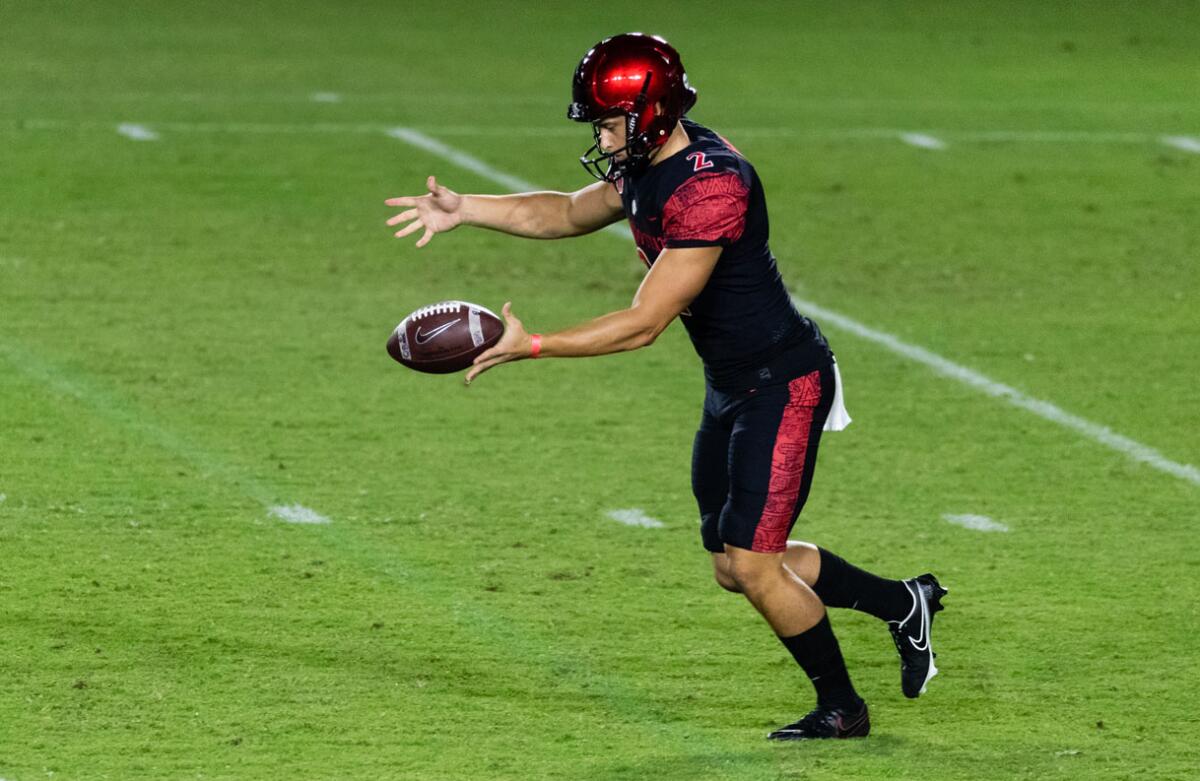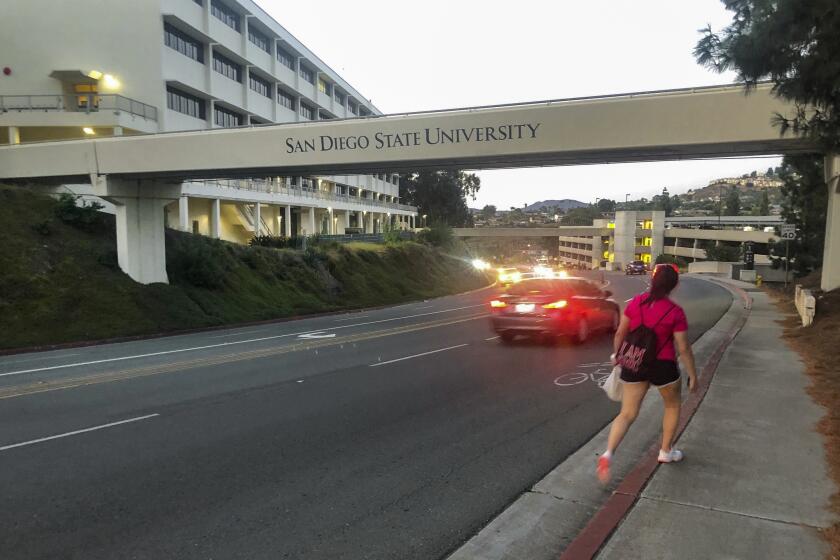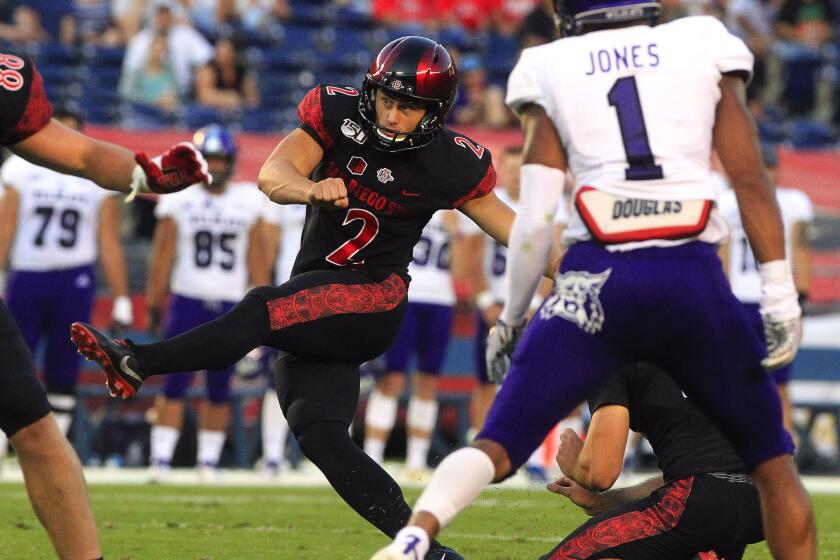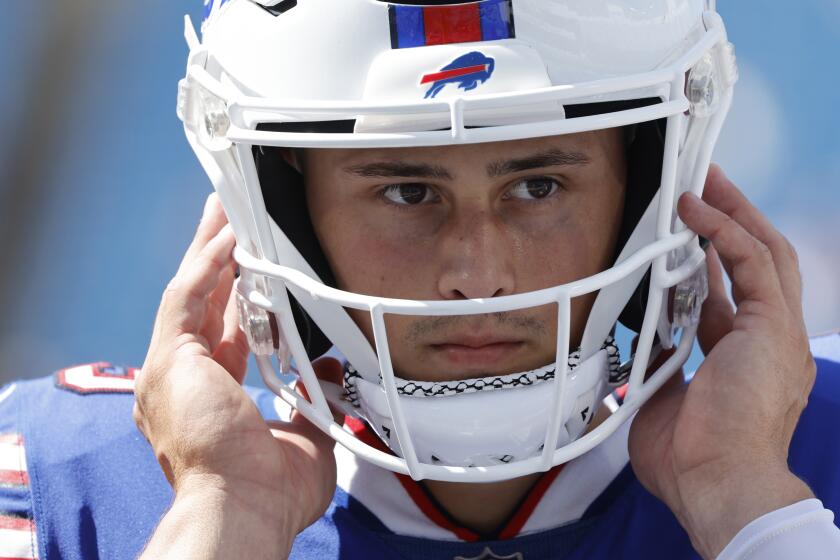NFL punter Matt Araiza and two San Diego State football players accused in gang-rape lawsuit

- Share via
A civil lawsuit filed Thursday in state court accuses three past and present San Diego State University football players — including a top punter now in the NFL — of gang raping a 17-year-old girl last year at an off-campus party.
Matt Araiza, 22, whose powerful and precision kicking in college earned him the moniker “Punt God,” was accused of having sex with the minor outside the home and then bringing her inside to a room where she was repeatedly raped. The lawsuit, filed in San Diego County Superior Court, alleges that the then-high school senior went in and out of consciousness but remembers moments as the men took turns assaulting her.
San Diego State University held off investigating at the request of police, who say their inquiry into the alleged October incident involving a minor is ongoing.
The other men named in the complaint are Zavier Leonard and Nowlin “Pa’a” Ewaliko. Leonard is listed on the university’s fall football roster as a redshirt freshman. Ewaliko was on the team last year as a freshman but is not on the current roster.
Araiza’s lawyer, Kerry Armstrong, said he hadn’t reviewed the complaint but called the rape accusation false. He said his investigator spoke to witnesses from the party who contradict the allegations against Araiza.
“It’s a shakedown because he’s now with the Buffalo Bills,” Armstrong said, adding, “There is no doubt in my mind” that Araiza didn’t rape the teen.
Attorney Marc Xavier Carlos, who is representing Ewaliko in an ongoing criminal investigation of the incident, said he could not comment on the lawsuit and that he was still investigating what transpired. He said his client is no longer at San Diego State. Attorney Jamahl Kersey, representing Leonard, said he had not seen the lawsuit and could not comment. He noted that a criminal investigation is ongoing and said no conclusions about his client should be drawn.
A lawyer for the woman who alleges she was raped by Araiza and two San Diego State football players publicly released excerpts of her diary.
The lawsuit comes as San Diego State faces ongoing criticism after a Times investigation found that the university decided not to alert the campus community about the alleged gang rape and waited more than seven months to launch its own investigation.
Campus officials have said police asked them to not take any action that would compromise their investigation and that they were not required by federal law to send out a crime notification. After The Times report, San Diego State officials began posting some information about the October incident on a campus website.
No arrests have been made and San Diego police have not publicly identified any suspects. Detectives recently submitted their investigation to the San Diego County district attorney’s office to determine whether charges should be filed.
The university launched a Title IX investigation last month after the city police department notified the school that doing so would not jeopardize the criminal inquiry. Title IX is the federal law that prohibits discrimination on the basis of sex at federally funded educational institutions. Araiza and Ewaliko would not have to comply with the campus investigation since they are no longer at the school.
If you or someone you know needs help, contact the RAINN (Rape, Abuse & Incest National Network) sexual assault hotline at (800) 656-4673 or visit the National Sexual Violence Resource Center.
Araiza earlier this week won the starting punting job for the Bills, among the early favorites to win Super Bowl LVII, after the team released veteran punter Matt Haack.
At San Diego State, he became the second player in program history to earn unanimous first-team All-American accolades. He set several NCAA records as a junior this past season, including for the most punts over 50 yards, and won the Ray Guy Award as the nation’s best collegiate punter. After being named Mountain West Conference special teams player of the year, he declared for the NFL draft.
Whether the lawsuit will affect Araiza’s pro status is unclear.
The lawsuit’s allegation comes on the heels of the NFL’s recent announcement that Cleveland Browns quarterback Deshaun Watson will serve an 11-game suspension without pay after being accused by more than two dozen women of sexual misconduct during massage sessions. Watson must also pay a $5-million fine, undergo evaluation by behavioral experts and follow their suggested treatment program.
“We were recently made aware of a civil complaint involving Matt from October 2021,” the Bills said in a statement to The Times on Thursday. “Due to the serious nature of the complaint, we conducted a thorough examination of this matter. As this is an ongoing civil case, we will have no other comment at this point.”
The Buffalo Bills have cut Matt Araiza, the punter accused of participating in a gang rape of a 17-year-old girl while at San Diego State.
Araiza’s name surfaced in connection with the rape allegation in at least one report made by student-athletes within days of the party to San Diego State officials through an anonymous campus reporting system.
“I hope this isn’t true for Matt’s sake,” a student said in an Oct. 26 report that was reviewed by The Times along with other internal records in the case. “But if it’s true I hope he gets the repercussions he deserves and [the] girl gets justice.”
At the time, the San Diego State Aztec football team was enjoying one of its best seasons in years.
Records show that one athlete told campus officials that students who had heard about the incident were questioning why campus officials had not investigated and whether coaches were “trying to sweep it under the rug because our football team is doing so well.”
Recent revelations about how California State University handled sexual harassment and workplace retaliation complaints have rocked the nation’s largest four-year public university system.
“Ninety-nine percent of the football players are aware of the five-person rape so the rest of the student-athletes are left wondering why nothing is being done,” the student said.
Last week, San Diego State President Adela de la Torre led a ribbon-cutting ceremony at the team’s new home, Snapdragon Stadium, an estimated $310-million venue that is a centerpiece of a multibillion-dollar campus development project.
The Aztec squad opens the 2022 season at its new stadium on Sept. 3 against Arizona in a game scheduled to be aired nationally by CBS.
The woman at the center of the lawsuit spoke out publicly for the first time last month. Now 18, she said she was traumatized and had to finish her senior year of high school online. The Times generally does not identify alleged victims of sex crimes, and her lawsuit identifies her as Jane Doe.
The off-campus party started on Oct. 16 and the assault, according to the lawsuit, occurred in the early hours of Oct. 17.
In her lawsuit, the woman said she had already been drinking with friends when they arrived at the party on Rockford Drive, and Araiza, who lived at the home, gave her a drink. She believes the drink “not only contained alcohol, but other intoxicating substances,” the complaint said.
Armstrong, Araiza’s attorney, said he does not believe the teen was under the influence of alcohol or drugs.
According to the lawsuit, the teen told Araiza she was a high school student and, even though he could see she was highly intoxicated, he told her to perform oral sex, then had sex with her. Then Araiza took her to a bedroom where Leonard, Ewaliko and at least one other man were, the complaint alleged, and threw her down on the bed face first. The lawsuit said she was raped for an hour and a half until the party was shut down.
The 18-year-old expressed frustration with the ongoing police inquiry and the lack of action by San Diego State.
During the assault, she noticed a light as if someone was taking a cellphone video, according to the complaint.
The teen “stumbled out of the room bloody and crying. Her nose, bellybutton, and ear piercings had been pulled out, and she was also bleeding from her vagina.”
As soon as she escaped, she told her friends she had been raped, the lawsuit said. A day later, she went to the city’s police department, where she waited about five hours before an officer spoke with her. She was taken to a hospital and underwent an extensive rape exam.
At the request of police, she made pretext calls — recorded by detectives — with the men named in the lawsuit whom police “had determined were present in the room when the rape occurred.” Araiza, the complaint alleged, confirmed on a call in late October that they had sex and recommended she get tested for a sexually transmitted disease. Later in the conversation, she asked him, “And did we have actual sex?” Araiza allegedly changed his tone and replied, “This is Matt Araiza. I don’t remember anything that happened that night.”
San Diego police detectives guided the young woman during her pretext calls, a Times review of text messages shows. The woman’s attorney, Daniel Gilleon, said police have not provided recordings of those calls or his client’s police report. The results of the rape exam have also not been disclosed, he said.
The teen has publicly criticized the city police department’s handling of her case, which she believed had stalled out after the new year, and San Diego State’s inaction. Her father, who spoke to The Times on the condition of anonymity, said that he shared his daughter’s account with campus police three days after the party but was never provided information for the Title IX investigation or complaint process.
The university said it asked San Diego police to provide the information to the victim, but has not answered repeated questions from The Times asking why campus police did not give that information directly to the victim’s father.
More to Read
Sign up for Essential California
The most important California stories and recommendations in your inbox every morning.
You may occasionally receive promotional content from the Los Angeles Times.
















